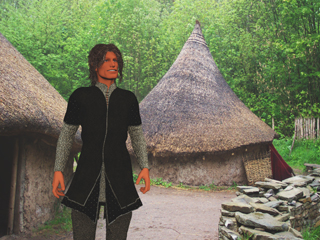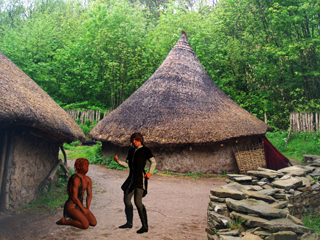

In a reading given on February 12, 1932 for a fifty-one year old motion picture producer, Edgar Cayce described a past life as an Atlantean named Uclz who lived during an early stage of the evolution of that culture:
In the one then before this we find in that land known as the Atlantean, during that period when there were the separations of the bodies as male and female, for the entity then began one of power in the period - and making for those of the first TEMPORAL abodes, in houses that were of peculiar structure, that oft comes to the entity's inner self in the present of that CIRCULAR home, house, abode, or city, or peoples, that there may be the proper differentiations in those of the abilities of individuals to mete out that of a PRODUCTIVE nature; whether the layman, that produces that of the original, or whether those that make for the change into the use of the various efforts of the various groups in THEIR respective sphere, or whether in that that DISTRIBUTES to the NEEDS of those that labor IN the various fields OF the passing of foods, apparel, OR what not, from the PRODUCTIVE end to that of the USER, or of the distributor. In the name Uclz. In the present may the entity, in the latter portion, gain much of visions that may lead to that wherein much as used, or abused (as the entity lost in that experience) for a MATERIAL, and if used properly - a soul development in the present. (2121-2)
Thus Uclz lived during a time of great change in Atlantis. There was the division of the sexes amongst the upper class Law of One faction who were in power and authority. Apparently Uclz was of that group, for he was said to be one of power when the first permanent housing ("TEMPORAL" abodes) were being built. Keep in mind that the early Atlanteans were "thought forms" and gradually materialized or "hardened" into physical flesh bodies. So for much of the very early periods of Atlantis there was no particular need for material shelter. One reading observes that when shelter was first required it consisted of nests in trees and caves, much as anthropologists have assumed.

But with the full materialization of the humanoid forms and establishment of social groups, permanent buildings and organizational structures were required. Since the Law of One was the dominant social group at this early stage and the circle was the symbol of the Law of One (representing unity and completeness), the circle was adopted as the organizing principle of design and aesthetics. Hence circular buildings, circular cities, and even circular "peoples."
Circular building design was common amongst ancient peoples. Essentially all one needs to create a perfect circle is a center point and a fixed measure (such as a cord or pole). So with a vertical pole inserted into the ground and the outer perimeter thus defined, it is simply a matter of erecting outer walls of stone or wood and connecting them to the top of the central pole. The circle makes for fast, simple, and strong construction. Certainly the concept would have become very sophisticated over time, but the images imagined by the twentieth century man who received this reading were probably pretty mundane.
The idea of circular cities in Atlantis goes back to Plato who described the capital city of Atlantis in just that way. His Dialogues detail the design of the city in terms of concentric circles alternating between land and water with walls as needed to maintain the circular layout.

The concept of circular peoples seem to relate to social classes as defined by status within the layout of the city. For example, Plato placed the most powerful and wealthy class at the center of his city where there was a palace and temple. Then, as one moved away from the city center through the concentric circles of city structure, social status diminished until one arrived at the outskirts where the lowest individuals in the society worked and dwelt. Similarly, the reading that describes Atlantis at the time of Uclz utilizes a socio-economic model based on production, distribution and consumption all organized in circles.
As an individual within this system, Uclz had power and apparently misused it during it during that sojourn. Perhaps he was negligent or abusive toward the lower class of workers, which was a common pattern in the class-conscious Atlantean society.